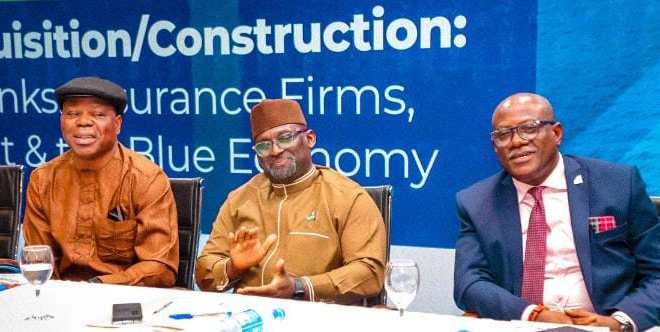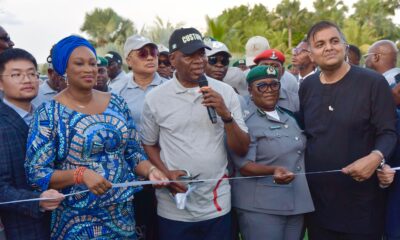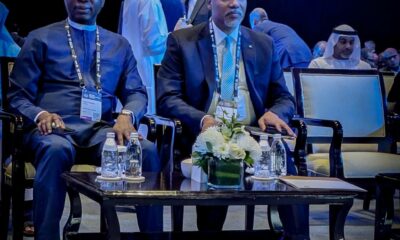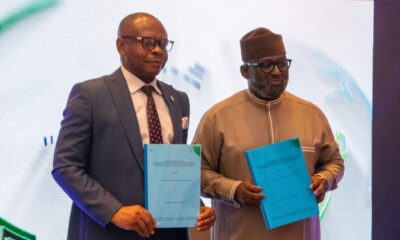Maritime
Stakeholders Lament Local Low Ship Acquisition And Finance Culture

BY GBOGBOWA GBOWA
Stakeholders in the nation’s maritime industry have lamented prevailing low investments in ships acquisitions due to lack of sluggish financing by local banks and insurance firms.
At the 2024 annual seminar organized by the Association of Maritime Journalist Association of Nigeria (AMJON) on Maritime Finance in Lagos on Thursday, stakeholders while bemoaning the low state of ships for indigenous cargo shipping business noted that the development has continued to hamper the growth of Nigerian shipping and maritime industry.
Presenting a keynote address, the MD/CEO, NLNG Shipping and Marine Services Limited (NSML), Abdulkadir Ahmed said that without adequate ship financing, the envisaged enhanced national growth tied to the marine and blue economy may remain unrealized.
This is even as he noted that such vessel acquisitions must also conform to standard and compliance not only in terms of maintaining the highest safety quality but also in operational and commercial efficiencies, in both local and international trading.
“Vessel ownership and acquisition occurs within 2 segments of the shipping industry – the sales and purchase segment where second-hand vessels are traded and acquired, and the new building market where new built vessels are constructed from scratch. Irrespective of the market owners’ play in, the importance and role of finance cannot be overemphasised.
“According to the Petrofin Index for Global Ship Finance, the top 40 banks lending to shipping in 2023 was US$284.27 billion, the total global bank lending of all banks, including local banks approached US$375 billion in 2023. Whilst a cautious and indicative figure for global ship finance, including all forms of lending – leasing, export finance and alternative providers – is approximately US$600 billion.”
On the operational and marketing dynamics of shipping, Ahmed said ship owners and agents must ensure a proper understanding of the dynamics in the constantly changing maritime environment to be able to remain going and profitable.
“Shipping is a hugely capital-intensive activity, and accessing financing is key for acquisition and construction activities. Irrespective of the market owners’ play in, the importance and role of finance cannot be overemphasised. The need to have fully compliant vessels trading internationally is of paramount importance and all stakeholders must understand the ever-changing dynamics to ensure compliance right from the point of conceptualising the acquisition or construction of the vessels.
On compliance, the NSML boss said nothing can be remitted, using his company’s operational ethics and work culture as example.
“NSML is unwavering in its operations of ensuring the vessels of clients are maintained to the highest standards globally, ensuring they are seaworthy, cargo-worthy and globally tradable. By so doing, we ensure that the owners enjoy a good return on investment (ROI) which is important to ensure the repayment of their loans.

“The shipping and maritime industry is a highly regulated one with great emphasis on safety, reliability and environmental sustainability. Compliance with conventions, regulations and guidelines primarily issued by the International Maritime Organisation (IMO). IMO’s SOLAS (Safety of Life at Sea) convention, MARPOL (Maritime Pollution) convention are core pillars of operation in the global maritime industry.
“With the drive for decarbonization and emphasis on the need to reduce greenhouse gas (GHG) emissions, to combat the threats posed by climate change, there are a plethora of new rules and regulations owners need to be aware of when acquiring vessels. For us in NSML, we have been at the vanguard of driving compliance with standards and the regular training and development of our personnel to future-proof them in the ever-dynamic maritime industry”, he added.
On his part, the Executive Secretary of the Nigerian Shippers’ Council, (NSC), Barr. Pius Ukeyima Akutah said that enabling robust policies and increased private sector investments will be able to close the existing gap.
Akutah who was represented by the NSC Principal Officer, Regulatory Services, Cadmus Temitope, said ship owners and players must intensify efforts in exploring financing options for vessels acquisition, noting that optimal harnessing of the nation’s blue economy revolves around local shipping capacity.
To achieve these goals, he urged all stakeholders to prioritise research and development (R&D) and to foster public-private partnerships that would support the Shipping Sector Support Fund, including the Cabotage Vessel Financing Fund (CVFF) and the Nigerian Content Development and Monitoring Board (NCDMB) Maritime Fund.
Speaking further, he said, “Nigeria is endowed with vast maritime resources, including inland and archipelagic waters, a territorial sea of 12 nautical miles, and an Exclusive Economic Zone extending up to 200 nautical miles. To maximize these resources, we must focus on ship repairs, vessel building, acquisition, and financing, all of which hold the potential to create significant job opportunities and drive socio-economic development.”
In his intervention, Comptroller General of the Nigeria Customs Service (NCS), Adewale Adeniyi advised that operators and players should consider local vessel construction as an option within the wide arrays of prospects available.
Represented by Comptroller Dera Nnadi, Customs Area Controller (CAC) of Tin Can Island Customs Command, Adeniyi notes that ship acquisition and construction is only possible through relevant synergy and partnership.
He highlighted the importance of vessels in effective and efficient international trade, noting that the Customs Service introduced barge operations to ease cargo movement, which has become a significant investment in the maritime industry.
The CGC said players can begin small with the construction of smaller vessels through homegrown technology with the Nigerian Navy leading given its potential capacity in the area as has already been demonstrated, overtime.
In his welcome address, the President of AMJON, Paul Ogbuokiri said that partners in national development, the group cannot afford to sit on the fence on the critical issues that will drive the nation’s marine and blue economy.
“With the coming of the Ministry of Marine and Blue Economy, and specifically noting that the Nigerian Government is looking to diversify the economy to boost revenue and putting an end to the country’s status; the time all hands must be the deck to develop the Nigerian maritime industry is now.”





































